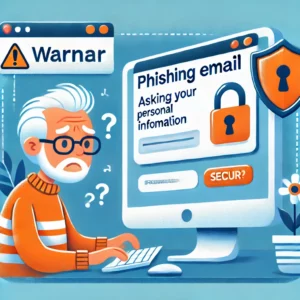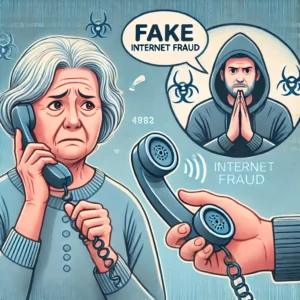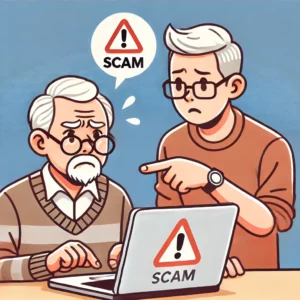Identifying and Avoiding Internet Scams Targeting Seniors
The internet has opened a world of opportunities, but it has also given scammers an easy way to exploit people—especially seniors. Older adults are often targeted due to their trusting nature, lack of digital literacy, or financial stability. From fraudulent emails to fake investment schemes, online scams are becoming more sophisticated.
Understanding how these scams work and knowing how to avoid them is key to protecting yourself and your loved ones. This guide will walk you through the most common internet scams targeting seniors, how to spot red flags, and steps to stay safe online.
Why Are Seniors Targeted by Scammers?
Scammers specifically target seniors for a few reasons:
✔️ Less familiarity with digital threats – Many older adults are not as tech-savvy as younger generations, making them more vulnerable.
✔️ More financial stability – Scammers assume seniors have pensions, retirement funds, or savings.
✔️ Trusting nature – Many seniors grew up in an era when scams weren’t as prevalent, making them more likely to believe a scammer’s story.
✔️ Social isolation – Scammers take advantage of loneliness to manipulate their victims into believing they are helping them.
With these factors in mind, let’s explore some of the most common scams that target seniors.
Top 5 Internet Scams Targeting Seniors
1. Tech Support Scams
A pop-up appears on your screen, warning you that your computer has a virus. It urges you to call a “Microsoft-certified technician” or “Apple Support” for immediate help.
🔴 Red Flags:
- An unexpected warning appears, often with flashing lights or loud noises.
- You’re asked to pay to fix a “problem” that didn’t exist before.
- The scammer asks for remote access to your computer.
✔️ How to Avoid It:
- Never call numbers from pop-up warnings.
- Keep your computer updated with security software.
- If you need support, contact the official customer service of your device’s manufacturer.
2. Medicare & Health Insurance Scams
You receive a call, email, or letter from someone claiming to be a Medicare representative, offering “free medical services” or asking for personal information.
🔴 Red Flags:
- They request your Medicare or Social Security number.
- They claim they need personal details to “update your records.”
- Offers for “free” DNA testing, COVID tests, or medical devices.
✔️ How to Avoid It:
- Medicare will never call you unsolicited.
- Do not share personal health information over the phone or email.
- If in doubt, call Medicare directly at 1-800-MEDICARE.

3. Romance & Social Media Scams
Scammers create fake online dating profiles or befriend seniors on Facebook or Instagram, gaining their trust before asking for money.
🔴 Red Flags:
- They express strong romantic feelings very quickly.
- They claim to be overseas (e.g., a soldier, doctor, or engineer).
- They ask for money due to “unexpected emergencies.”
✔️ How to Avoid It:
- Never send money to someone you haven’t met in person.
- Be cautious of love interests who avoid video calls or in-person meetings.
- Reverse-search their profile photos on Google to see if they’ve been used elsewhere.
4. Grandparent Scams
A scammer calls pretending to be a grandchild in distress, often saying, “Grandma, it’s me! I’m in trouble!” and asking for urgent financial help.

🔴 Red Flags:
- The caller asks you to send money immediately via wire transfer or gift cards.
- They tell you not to inform anyone else (especially parents).
- The voice sounds slightly off or unfamiliar.
✔️ How to Avoid It:
- Ask personal questions only your real grandchild would know.
- Call a family member to verify the situation.
- Never send money based on an emotional plea without confirmation.
5. Fake Sweepstakes & Lottery Scams
You receive a call or email claiming you’ve won a large sum of money, but before you can collect it, you must pay taxes or fees upfront.
🔴 Red Flags:
- You’re told to keep your “win” a secret.
- You must pay money before receiving any winnings.
- The email contains typos or comes from a free email service like @gmail.com instead of an official website.
✔️ How to Avoid It:
- If you didn’t enter a contest, you did not win.
- No legitimate sweepstakes requires an upfront payment.
- Verify claims by searching online or contacting the company directly.
How to Spot a Scam: Warning Signs to Watch For
Here are some quick red flags that often indicate a scam:
🚨 Urgency & Pressure – Scammers rush you into making quick decisions without time to think.
🚨 Requests for Personal Info – Be skeptical of emails or calls asking for Social Security, banking, or Medicare details.
🚨 Unusual Payment Requests – If they ask for payment via gift cards, cryptocurrency, or wire transfers, it’s a scam.
🚨 Too-Good-To-Be-True Offers – Unexpected winnings, “guaranteed investment returns,” or fake employment opportunities are suspicious.
🚨 Poor Grammar & Spelling Errors – Many scams contain obvious typos, odd phrasing, or unprofessional-looking emails.
🚨 Unverified Contact Details – If a phone number, email, or website seems suspicious, research it before engaging.
Protecting Seniors: How to Stay Safe Online
🔹 Enable Two-Factor Authentication (2FA) – Adds an extra layer of security to your accounts.
🔹 Use Strong, Unique Passwords – Avoid using the same password across multiple accounts.
🔹 Keep Software Updated – Ensure your computer, phone, and antivirus programs are current.
🔹 Be Skeptical of Unsolicited Messages – If a company reaches out unexpectedly, verify before responding.
🔹 Educate Yourself & Others – Stay informed about new scams and discuss them with friends or family.
🔹 Join a Scam Alert Network – Organizations like the AARP Fraud Watch Network provide scam alerts specifically for seniors.
What to Do If You’re Scammed
1️⃣ Stop Communication – If you suspect a scam, cut off contact immediately.
2️⃣ Report the Scam – File a complaint with the Federal Trade Commission (FTC) at reportfraud.ftc.gov.
3️⃣ Contact Your Bank – If you sent money, notify your bank or credit card company immediately to attempt a reversal.
4️⃣ Monitor Your Accounts – Watch for suspicious transactions or identity theft warning signs.
5️⃣ Warn Others – Share your experience so others don’t fall for the same scam.
📌 Print and keep this checklist near your phone or computer as a quick reference!
🛑 Scam Prevention Checklist for Seniors ✅
Protect yourself from internet fraud with these simple steps.
🚨 Spot the Warning Signs:
✅ Unsolicited calls, emails, or messages asking for personal information.
✅ Messages creating a sense of urgency (e.g., “Act now or lose your account!”).
✅ Requests for money via gift cards, wire transfers, or cryptocurrency.
✅ Too-good-to-be-true offers, such as lottery winnings or high-return investments.
✅ Poor grammar, misspellings, or unusual sender email addresses.
✅ Unexpected friend requests from strangers or “relatives” on social media.
🔒 Stay Safe Online:
✅ Never share Social Security, Medicare, or banking details over the phone or online.
✅ Enable two-factor authentication (2FA) for email, banking, and social media accounts.
✅ Use strong, unique passwords for different websites and apps.
✅ Verify before clicking links—hover over them first to check authenticity.
✅ Don’t engage with pop-ups that claim your computer has a virus—close the window.
✅ Keep your computer, phone, and antivirus software updated.
📞 What to Do If You Suspect a Scam:
✅ Stop communication with the suspected scammer immediately.
✅ Report the scam to the Federal Trade Commission (FTC) at reportfraud.ftc.gov.
✅ Notify your bank or credit card company if financial information was compromised.
✅ Monitor your financial accounts for suspicious transactions.
✅ Tell a family member or friend to help protect others from falling victim.
🛡️ Stay Informed:
✅ Sign up for scam alerts from AARP Fraud Watch Network or local authorities.
✅ Join online safety workshops at your library or senior center.
✅ Keep an open dialogue with loved ones about potential scam threats.
🔹 Remember: If something feels off, trust your instincts! Pause, verify, and report before taking action.
Final Thoughts
The internet can be a great resource for seniors, but it also presents risks. Scammers continue to evolve, making it crucial to stay informed, stay cautious, and stay connected.
By recognizing red flags, following security best practices, and spreading awareness, you can help protect yourself and your loved ones from online fraud.
🚨 Stay alert, trust your instincts, and always double-check before taking action! 🚨

My name is Larry, and I’d like to thank you for visiting Senior Citizens Fitness. I’m so passionate about staying fit in my later years. I hope you found some useful information here. Thanks again, and please subscribe and leave comments.
Larry Mac



